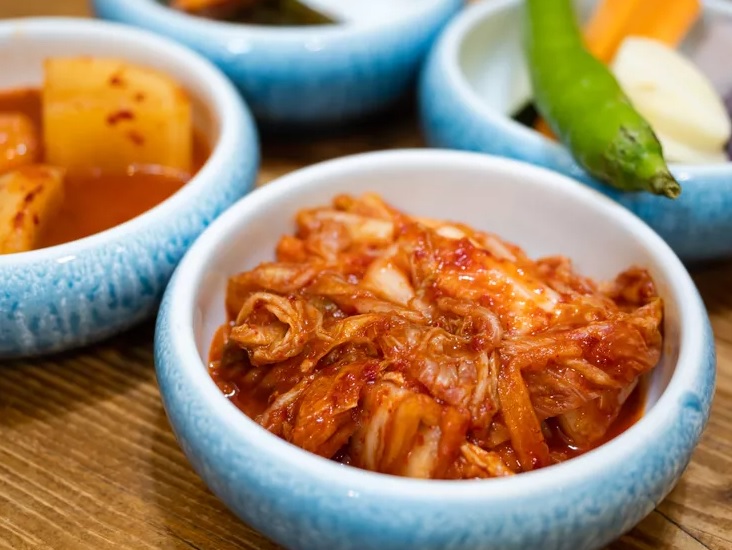Top 5 probiotic-rich foods to boost your health
 Foods that contain probiotics (Photo: freepik.com)
Foods that contain probiotics (Photo: freepik.com)
Probiotics can help increase the diversity of your gut microbiome, supporting digestive, immune, and mental health.
Which foods contain them, and why you should consume them - read more in the article below.
What you need to know about probiotics and why they are important for your body
Your gut microbiome consists of microorganisms (microbes) such as bacteria, viruses, and fungi that live in your digestive tract. Your microbiome can affect bodily functions such as digestion, metabolism, and immune system regulation.
However, the microbes in your gut are not always beneficial. If your microbiome is imbalanced between healthy and unhealthy microbes, probiotics can help restore healthy microbes to your body.
Probiotics are live microorganisms that you can consume through food or supplements. Some studies have shown that they can have antioxidant effects, helping to reduce inflammation in your body and potentially increasing the bacterial diversity of your gut microbiome.
Most probiotic foods are fermented since fermentation introduces live microorganisms. However, not all fermented foods contain probiotics.
If food is heated after fermentation (e.g., for sourdough bread), the beneficial microorganisms die.
On the other hand, yogurt retains the live microorganisms added during fermentation. There is increasing research on probiotics as functional foods, leading to the development of new probiotic products, such as new pre- and probiotic sodas.
Five best probiotic foods
Kefir
Kefir is a fermented milk drink that contains many probiotics. It is made by mixing milk with fermented kefir grains, a culture of yeast and lactic acid bacteria.
Seeding is a laboratory method that gives microorganisms the time, space, and food needed to reproduce. The fermentation process introduces a mixture of bacteria and yeast that serve as probiotics.
Kefir can be consumed on its own or added to smoothies. It is also a good source of protein and calcium and is often fortified with vitamins. Most people with lactose intolerance can tolerate kefir well.
Kimchi
One of Korea's most popular dishes, kimchi, has recently gained popularity in Ukraine as people have become more interested in probiotics. It is a dish made by fermenting vegetables.
It often includes cabbage, radishes, cucumbers, and onions. Kimchi is particularly rich in lactic acid bacteria, a type of probiotic.
Kimchi can range from mild to spicy.
Studies have found that fermented kimchi helps reduce the concentration of potentially harmful gut bacteria and promotes healthy blood glucose, blood pressure, and cholesterol levels.
Kimchi is a good source of probiotics and is rich in fiber, another essential nutrient for gut health. Fiber supports healthy cholesterol and blood sugar levels, further complementing kimchi's health benefits.

Kimchi is a dish from Korea (Screenshot)
Kombucha
Kombucha is a fizzy fermented drink made from tea, sugar, yeast, and bacteria. It is often fermented with fruits to add flavor. Active yeast converts sugar during the fermentation process, resulting in a minimal amount of alcohol.
Studies have demonstrated many health benefits of kombucha, but additional confirmation is needed. One study highlighted that some types of kombucha might benefit your health due to their probiotics, vitamins, and antioxidants, but they are not adequately regulated. Pregnant women and people with weakened immune systems should be cautious and consult their doctor before consumption.

Kombucha is a beverage based on kombucha (screenshot)
Sauerkraut
Sauerkraut is a traditional Ukrainian dish that is also popular in many regions of Europe and the United States.
Cabbage is fermented in lactic acid bacteria, which serve as probiotics. One study showed that sauerkraut retains most of its beneficial bacteria throughout the fermentation and packaging process, making it an excellent probiotic food.
Yogurt
One of the most common dietary sources of probiotics is yogurt. It is a fermented milk product similar to kefir. It is made by heating milk, adding bacteria, and allowing it to ferment for several hours.
The most common types of bacteria are Lactobacillus and Bifidobacterium. Yogurt, especially Greek or Icelandic Skyr, is also a good source of protein. It also contains calcium and vitamin D.
Yogurt can be consumed independently, added to smoothies, or made into parfaits with fruits and granola.
Earlier, we reported on 7 healthy fruits and vegetables everyone should eat this summer.
Sources: National Center for Complementary and Integrative Health, U.S. Department of Agriculture: FoodData Central, National Institutes of Health.
This material is for informational purposes only and should not be used for medical diagnosis or self-treatment. Our goal is to provide readers with accurate information about symptoms, causes, and methods of detecting diseases. RBС-Ukraine is not responsible for any diagnoses that readers may make based on materials from the resource. We do not recommend self-treatment and advise consulting a doctor in case of any health concerns.

